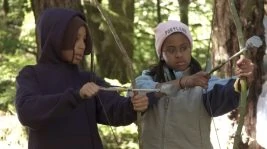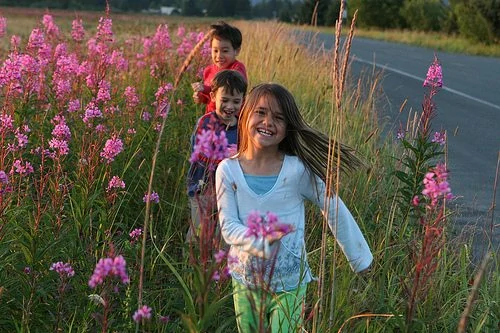“Serendipity” – the idea of the happy or fortuitous accident – is a wonderful word, inspired by a Persian fairy tale in which three princes from Serendip (the old name for Ceylon, now Sri Lanka) who “were always making discoveries, by accidents and sagacity, of things they were not in quest of.” It’s also a wonderful concept, sometimes bound up with the notion of synchronicity, or simultaneous events that seem to be meaningfully connected.
Both terms came to mind the other day when we received information about a new documentary coming here to Portland that taps into some of our ongoing concerns about children’s health and well-being and new tools we’ve created to address them.
Play Again explores the impact of our screen-dominated culture on kids and their relationship to the natural world. Media overload is an issue we’ve covered here before – one which the film’s synopsis describes powerfully:
The average American child now spends over 8 hours in front of a screen each day. She emails, texts, and updates her status incessantly. He can name hundreds of corporate logos, but less than ten native plants. She aspires to have hundreds of online friends, most she may never meet in person. He masters complicated situations presented in game after game, but often avoids simple person-to-person conversation. They are almost entirely out of contact with the world that, over millions of years of evolution, shaped human beings — the natural world.
The long-term consequences of this experiment on human development remain to be seen, but the stakes couldn’t be higher. By most accounts, this generation will face multiple crises — environmental, economic and social. Will this screen world — and its bevy of virtual experiences — have adequately prepared these “digital natives” to address the problems they’ll face, problems on whose resolution their own survival may depend?
In their quest to find out, the filmmakers followed 6 teenagers leading screen-dominated lives as they unplug and embark on “a wilderness adventure – no electricity, no cell phone coverage, no virtual reality.” Balanced by expert commentary from the likes of sociologist Juliet Schor, environmental writer Bill McKibben and others, the film “investigates the consequences of a childhood removed from nature and encourages action for a sustainable future.”
The consequences are exactly why we strive to develop even more tools and resources to help you help children reconnect with nature. For instance, there’s our Sustainable Future course- which shows how Yoga Calm and environmental education activities can be integrated to develop high-interest, interdisciplinary lessons that meet and support K-8 health, science and physical education standards and curricula. Through exploring techniques of physical yoga, observation, self-reflection, social/emotional skills development, storytelling and simple schoolyard explorations, participants learn how to cultivate children’s innate curiosity and appreciation of their bodies, each other, animal life and other aspects of their natural, daily environment.
What’s more, children can experience these activities for themselves at a Yoga Calm Summer Camp – a new program we’re rolling out this summer. Combining yoga, environmental education, music and social skills games over the course of a week, the camp gives kids the opportunity to sink into the experience and have time to dream and explore nature while learning wellness habits and essential personal and social skills — learning to live and work together in a peaceful, mindful way. The first of this year’s camps are listed on our Kids’ Classes Schedule. (Certified Yoga Calm Instructors can host these camps, as well. Contact our business office for further information.)
Last, our new Yoga Calm Environmental Education Handbook will be out soon, demonstrating ways of adapting the Yoga Calm for Children curriculum to teach children about the natural world and help them get in touch with natural environments. We’ll have more news about this and our other new titles as we get closer to their publication dates.
Play Again will be shown on Saturday, June 11 at Lewis & Clark College here in Portland. Details are available on the film’s website, along with info about other upcoming screenings around the country and how to host a screening in your own geographic area.
Meantime, if you want to learn more about children’s relationship to the natural environment and how Yoga Calm can help facilitate a better, more meaningful relationship, do read our earlier post, “Healthy Children = Healthy Planet, or ‘No Child Left Inside.'”.
What are some of your favorite ways of helping kids get outside and reconnecting with nature? Let us know in the comments!






